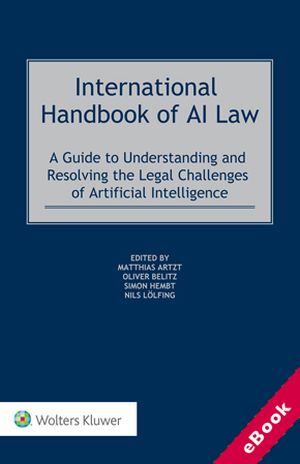
The device(s) you use to access the eBook content must be authorized with an Adobe ID before you download the product otherwise it will fail to register correctly.
For further information see https://www.wildy.com/ebook-formats
Once the order is confirmed an automated e-mail will be sent to you to allow you to download the eBook.
All eBooks are supplied firm sale and cannot be returned. If you believe there is a fault with your eBook then contact us on ebooks@wildy.com and we will help in resolving the issue. This does not affect your statutory rights.
International Handbook of AI Law, an indispensable handbook, written in clear language by international experts from all over the world, elucidates the complex relationship between AI and the law, covering both existing laws and emerging AI-specific legal regulations. Recently, the field of Artificial Intelligence (AI) has seen remarkable advances, revolutionizing how we live, work, and interact with technology. As AI systems grow increasingly sophisticated and autonomous, they raise new and challenging legal questions, particularly regarding AI-specific risks associated with automated systems.
This book commences with a comprehensive and insightful technical analysis of how AI works and progresses with chapters covering a wide array of legal fields relevant to AI technology focusing on the legal framework in the EU.
The topics included are:
The book concludes with country reports on the legal and regulatory environment in the United Kingdom, the United States, China, and Japan, contrasting them with the EU legal framework.
Every chapter provides pragmatic advice on the implementation of legal principles, making the handbook a valuable resource for real-world applications. This essential guide will prove to be immensely valuable to practitioners, policymakers, academics, and others seeking a deep understanding of the complex legal challenges posed by AI use. The handbook aids in responsible and trustworthy AI development and use by guiding decision-making, reducing risks, and protecting the rights and well-being of individuals and society.